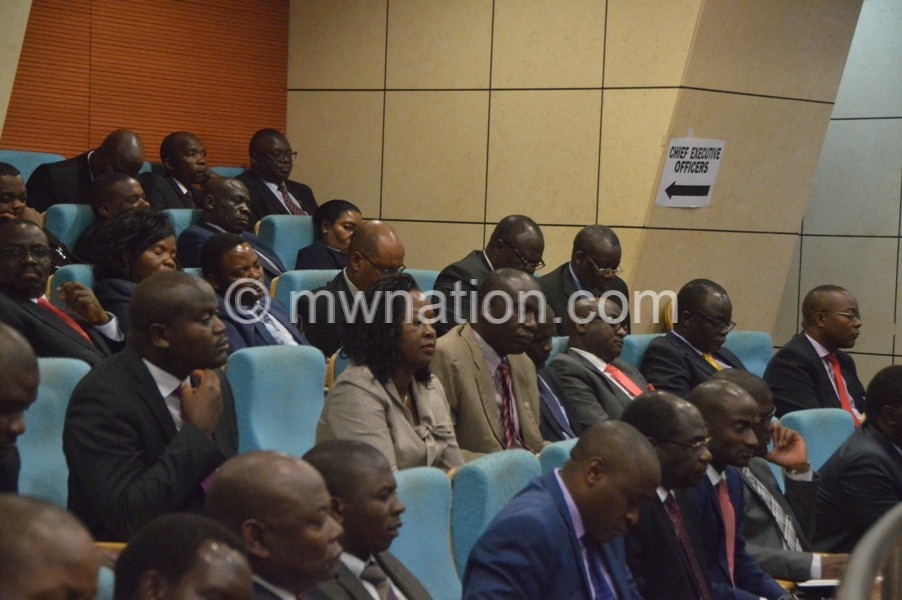Goodall warns on plunder
Purse-keeper Goodall Gondwe yesterday took the public by surprise in his Budget Statement in Parliament when he warned about wastage of resources within the public sector.
The statement shocked most of the members of Parliament (MPs) on the government side in the House who looked dumbfounded.

Gondwe, presenting the K1.1 trillion 2017/2018 National Budget, warned government officials to stop abusing State resources, saying the practice pushes back the country’s economy into a dungeon.
“I owe it to the House to point out that an economic rebound does not mean that we now have enough resources to spend. It merely means that we have emerged out of the hole into which we were thrust by the ‘Cashgate’ episode and that we can now commence an economic management that should lead to robust economic growth,”he warned.
The remarks resonated well with the business sector in the country.
Malawi Confederation of Chambers of Commerce and Industry (MCCCI) president Karl Chokotho hailed Gondwe for coming out clear on the issue of corruption and abuse of public resources.
However, he called for more resolute action to deal with issues of fraud and corruption from the Democratic Progressive Party (DPP) government.
Said Chokotho: “I welcome the remarks made by the finance minister. It is a key message that requires more of incisive action to bust corruption in the country. While it is encouraging to hear such words from the minister, government must ensure that it puts down measures that will rid the country of corruption. Mere increase in funding for watchdog bodies will not entirely do the magic.”
Chokotho alluded to failure of the economy to grow to the rising levels of fraud and corruption in the country, which he said was stifling the economy.
Chokotho’s remarks were echoed by Chancellor College-based economic professor Ben Kaluwa, who said the country is still grappling with wastage of State resources.
Gondwe told the House that the government still has an uphill task to improve in economic management, citing misuse of public funds in many ministries, departments and agencies (MDAs).
The finance minister said, among others, there was still lack of systematic reconciliation and compliance of public finance management rules and regulations.
He said, hence, the Ministry of Finance, Economic Planning and Development had embarked on a regular exercise to audit MDAs citing the audit of about 20 district councils in the just-ending financial year as an example.
“Wastage of public resources has always been one area that the government needs to seriously look at. The budget to me looks well-balanced as it is principally correct. But the output side of it is where things get wrong. A lot of money is stolen within the public sector. We hope government is now looking at the implementation side of the budget, because it is what matters most,” he said.
But Kaluwa hailed the budget as having addressed the concerns of low income earners by, among other things, removing VAT on milk, increasing the tax free bracket and raising the minimum wage from K19 000 to K25 000.
Budget must match delivery
Another University of Malawi economist, Exley Silumbu, yesterday warned that budgetary increases made this year to government institutions must be reflected in improved service delivery.
Gondwe yesterday announced the budgetary increases to governance institutions such as the Anti-Corruption Bureau (ACB), the office of the Director of Public Prosecutions (DPP), Judiciary, Legal Aid Bureau and the Directorate of Assets Declarations.
“People would expect to see improved services in these institutions. With poor funding in these governance institutions previously, there was always suspicion that the reasons could be political—to suffocate these institutions—so that politicians, for example, facing criminal cases, must not be investigated or prosecuted.
“But with the increases, it must be seen that these institutions are providing services they are mandated to,” Silumbu said.
The economist also praised government for increasing the pension budget from K50 billion last year to K70 billion, adding that the increase may mean that gratuity in value has increased.
He said the pension increase was expected because of the recent public service reforms programme which saw civil servants, including senior officers such as principal secretaries, retiring.
Silumbu has since advised that there was a need for government to fill vacancies in public institutions if it were to achieve sustainable goals, adding that most services are slow due to shortage of officers. n





